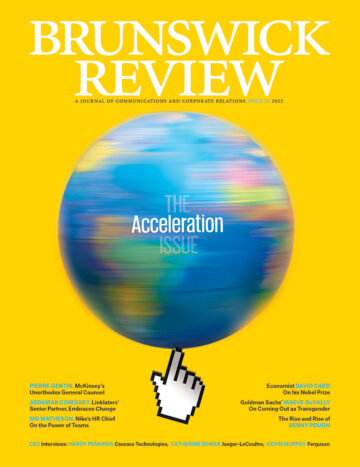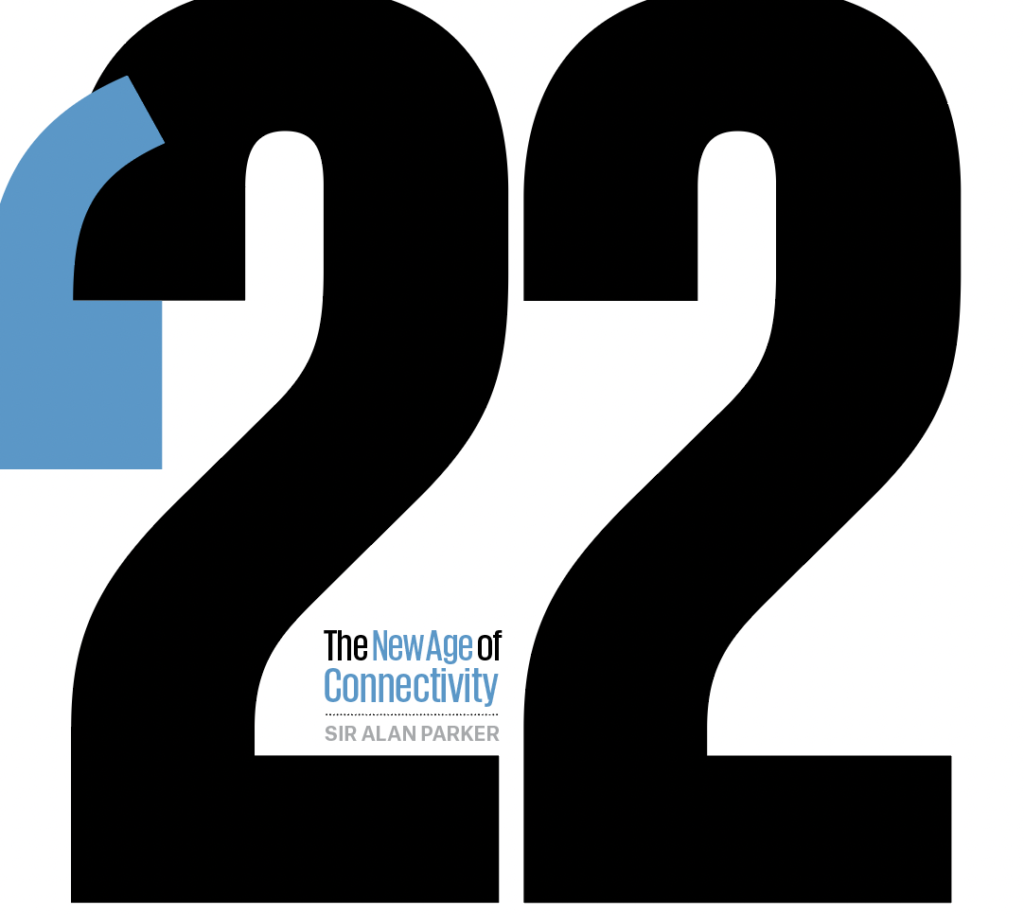The connectivity story of the moment is the fast-growing connection between business and the big social, political and financial issues we now find around us, writes Brunswick Chairman Sir Alan Parker.
We are entering a new age of connectivity. to many ears, that term plays as a technology story, a story that’s been around a long time yet is still unfolding and has a big next chapter coming. From where we sit at Brunswick, however, the connectivity story of the moment is the fast-growing connection between business and the big social, political and financial issues we now find around us.
Previously wider social issues were recognized and maybe “navigated” by business leaders, but business in general tried to stay at arm’s length lest they distracted from the Milton Friedman purpose of profit. That has changed fast, the statue of Milton Friedman in the corporate square has been toppled and replaced with a crowd of different and very demanding stakeholders.
It is not that the profit imperative has lessened, it is just that in a multi-stakeholder world there are lot of other stakeholder perspectives and voices that have to be taken into account in achieving that sustainable profitability –in every sense of the term “sustainable”.
Some might say multi-stakeholder capitalism is more interesting, some more meaningful, but leaders everywhere would say it is more difficult. Transitioning an organization to deal with all of these new and changing agendas is extremely challenging to resource and structure.
At Brunswick, we do not see this settling down. We see it accelerating, and leading over time to a profound change in the role that business plays in our lives and society.
A MOMENTOUS 3 YEARS
To appreciate the trend line and the speed of change, you only have to look back at the last three years.
The pandemic was transformative in our engagement with colleagues, employees and communities. COVID required leadership to engage with the health and safety of their colleagues at an unprecedented level and then, with lockdowns virtually everywhere, those leaders turned to colleagues’ mental health. Never before have those issues landed on any boardroom agenda I have seen.
The employee agenda has gone on to be transformed. Now we live in a world where, in many industries, when an employee turns up at work is dictated not by management edicts but personal issues or preferences. Before COVID, this felt unimaginable. We have been impacted by a worldwide change whose future is hard to chart. There is simply no playbook for it.
Then, in the summer of 2020, we had the terrible and tragic death of George Floyd and new momentum behind the Black Lives Matter movement. This held up to the light some of the greatest inequalities in our societies and created a wave of corporate responses and commitments, many of which were long overdue— similar to the “Me Too” push toward greater gender equality.
In the last year, the business world stepped up on three occasions and three huge issues: making unprecedented climate commitments at COP26, delivering a remarkable response to Russia’s invasion of Ukraine, and responding with pace on reproductive rights in the United States following the overruling of Roe vs Wade.
At COP, every sector, even the most complex ones like steel, transport and energy, made unprecedented promises, on which they understand that they need to deliver and that they will be held to account. We were proud to work for Mark Carney’s Glasgow Financial Alliance for Net Zero (GFANZ) group which lifted commitments by financial services from what felt like a serious $5 trillion prior, to a phenomenal $130 trillion by the time they arrived at the summit. To put climate commitments in perspective, they were described to me in Glasgow as equivalent to half of our global annual budget on the pandemic, every year for the next 30 years.
But it is remarkable to see the business community step up with more coherence than governments. Companies are no longer just acting to be “less of a problem” but positioning themselves to play a serious part in creating and being part of the solutions. Now to convert these commitments into action.
Similarly, the response from business leaders to the invasion of Ukraine was not expected, planned or centrally coordinated. It happened organically and rapidly across all sectors. Again, business took bold and active leadership at real cost to its bottom-line. On reproductive rights, business leaders again responded in real time and took a public position on a non-commercial subject. They felt it was the right thing to do. Given the state of our politics, such positions were fraught and taken in an environment with uncertain legal and economic consequences for businesses stepping up.
Business leaders have increasingly been clear about the reality that they have to take positions on each of these issues as they come at them. It has almost been wave after wave and one of the biggest challenges is to recognize what you do have to engage with and what you should stand back from. An attitude that says, “I see the problem, and I’ve got to decide what I am to it, what it is to me and how we’re going to go address it.”

4 BIG ACCELERATORS
For many reasons, we see these critical issues and the demand for action accelerating and commanding a more significant part of business leaders’ agenda. Four major drivers stand out.
1. SCALE & VISIBILITY Many of the biggest issues in our society issues are now more visible, measurable and urgent.
Inequality has not just grown it is more visible, more intersectional and more measurable than ever. When we started Brunswick 35 years ago, in rough numbers, the richest 1% of Americans owned 17% of the assets in America, and the working class, the middle 60%, owned more than twice that at 36%. Last year the 1% overtook the middle 60%. That is a measurably growing problem and one that will impact our collective ability to address many others if we cut this data even further by age, race or political participation.
On the environment, one example that brings the growing scale of our problems to life is The Great Pacific Garbage Patch. It is basically a lake of plastic waste floating around the Pacific. It is now twice the size of Texas, three times the size of France. It is hard to imagine that regulators, activists and all of us will not want to make it their life’s mission to not only stop it from growing but to actually get rid of it. The Pacific Patch is only one of five such “patches” on the planet and we continue to produce approximately 4 billion tons more plastic a year.
2. ESG ESG matters to all of our clients but it is still at an early stage. It is extremely complex and still developing, but we believe there are two key things to remember when approaching the subject.
ESG is fundamentally about consumer choice and investor demand. It is about people wanting to put their savings and investment in companies that are committing to report on a number of societal metrics. When you are asked “do you want your money in an ESG or non ESG fund” not many people nowadays blithely say “non-ESG please.”
Most of us do not fully understand what ESG means anymore than we do how an EV works, but it feels like the right future direction to go and so like Musk—and the whole auto industry—the fund management community has responded with products to meet that demand. Corporate leadership has no choice but to comply to access the capital those funds manage. Global ESG fund assets increased to $2.74 trillion in December 2021, Morningstar tells us, from $1.65 trillion a year earlier and $1.28 trillion at the end of 2019.
At a basic level, ESG is a risk management metric for investors and fund managers. It will not directly solve the world’s issues in these areas but it will permit and push management to address them. Many companies already report on these issues because it improves their relationships with customers, staff, suppliers, regulators etc. What we will see now is a requirement coming at a totally different level.
3. EXPLOSION OF DATA & NON-FINANCIAL REPORTING The third massive accelerator is directly linked to ESG: It is the nascent explosion of non-financial reporting. It will soon be a new era for transparency and accountability where companies will need to be clear on the metrics that will demonstrate they are meaningfully moving toward their targets. We are about to see an explosion in the amount of data that will be captured, analyzed and publicized.
The great underlying beast surfacing here is the ability to quantify externalities. This pencil I’m holding: You’ll be able to tell where this pencil came from, where the wood came from, where the lead came from and what the emissions were. Customers and regulators will be able to compare products, process and impacts.
The next generation of tech now coming into play will make sure of that. The internet of things, the growth of super computers (1 million times faster than our current laptops) and most importantly the Web3 and blockchain technologies—all will contribute to unimaginable changes in our data capture and processing.
ESG is the first generation of non-financial reporting. It will doubtless evolve fast with the SEC and ISSB expected to step in later this year. This will be a big step forward for ESG but it remains only the very beginning in dealing with all the available data and the appetite for it to be analyzed and disclosed. If you know it, you will be under huge pressure to show it.
Accounting firms are investing fast in the capabilities to deal with this reporting, strategy firms are building advice on how to deal with it. We, at Brunswick, are building the capabilities to help our clients understand and respond, not just to recognize the scale and nature of required changes, but crucially to help them carry the support of their stakeholders as they transition their business.
4. THE NEXT GEN POWER The greatest pressure I see on corporate leadership comes not from the boardroom table but the kitchen table. For large periods of time through COVID, many leaders literally sat across the table from their next generation.
The Next Gen has very clear views on a form of capitalism that they believe damages the environment, creates unimaginable levels of inequality, ignores human rights and fails to address the big issues of our time—which the Next Gen sees as an unwanted inheritance from their parents’ generation. They feel perfectly licensed to demand change and their views are increasingly uncompromising. They are a generation of born, global activists, connected with the power of social media and they will let leaders know which issues they expect you to take a position on. They also expect a plan, and that plan better be practical and measurable, and this generation can be counted on to help put it into action.
If their vocal influence is not enough, it is estimated that over the next couple of decades there will be a generational handover of wealth of more than $15 trillion. In a world where these issues will grow ever more present, the Next Gen will be gaining control of the firepower to directly change the way business works.
THE CHANGING ROLE OF BUSINESS IN SOCIETY
The whole world feels anxious and worried. Problems appear to be multiplying. Along with this is an increasing sense of urgency to make change and find solutions. The decline in trust in politicians and institutions is also accelerating, thereby elevating the perceived role business can play. Everyone knows their employer cannot outright solve inequality or climate change. But you can persuade your employer to take action more easily than you can your political leaders. We foresee a whole new wave of activism from all stakeholders, but employees in particular.
To deliver meaningful change though, business cannot do it alone. There will need to be more imaginative public-private partnerships with governments at national and local levels and civil society organizations. This is evident in Biden’s Inflation Reduction Act where government is engaging and investing in business as a national-interest issue in an unprecedented way.
Business is seen to have the talent, the innovation, the money and delivery capability to bring about change. Household names such as Musk, Gates, Jobs and Cook have created massive transformations, and ahead lies enormous opportunity for enterprise to reduce the burden of oppression, poverty, illness and isolation.
The expectations on businesses are going to grow hugely and increasingly complex. I think the role of leadership at every level and in all forms will be come more challenging. But a number of corporate pioneers have demonstrated that skillfull management and true leadership can achieve a more balanced scorecard and create wealth in a range of forms that can be shared.
We see business becoming less of a socially isolated financial activity, while playing a much more sophisticated and integrated role in society. A role in which business retains the innovation and creativity of enterprise but is powered up by a far greater engagement across society at all levels.
We have built the firm over the last 35 years to help the leaders of the largest wealth creating organizations to look outward towards the interconnected financial, political and societal worlds. We are proud to be standing alongside them as they demonstrate that the power and benefits of enterprise have always been bigger than financial returns alone.
More from this issue

Acceleration
Most read from this issue

The Storyteller





